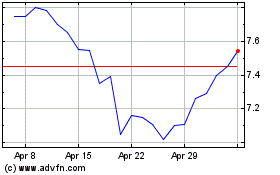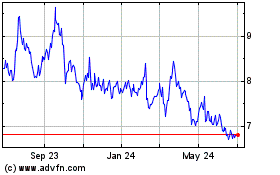Audi's China Dealers Seek to Block Deal With SAIC Motor
November 22 2016 - 4:00AM
Dow Jones News
SHANGHAI—Audi AG dealers in China have threatened to take action
against an agreement that paves the way for the country's largest
auto maker to build and sell Audi vehicles there, fearing it would
dilute already thinning profits as sales slow.
If the German auto maker doesn't call off its agreement to
explore a tie-up with SAIC Motor Corp., China's largest auto maker
by sales, the dealers said they would demand "hundreds of billions
of yuan" in compensation for potential lost sales. They have also
threatened to not accept new Audi vehicles from December, some of
the dealers told The Wall Street Journal on Tuesday.
Representatives from 15 dealer groups, which have a combined 150
Audi dealerships, met with Audi's top executives in China on
Monday, dealers participating in the talks said. The talks didn't
yield any outcome, they said.
Officials from Audi and SAIC weren't immediately available for
comment. The companies signed a memorandum of understanding on
potential cooperation earlier this month. SAIC is also a partner of
General Motors Co.
Currently, Audi makes and sells cars in China through a
three-party joint venture with Volkswagen AG and FAW Group Corp.
Dealers say an additional joint venture would add more dealerships
to a network already struggling with slower sales and sliding
profits.
"We firmly oppose Audi's tie-up with SAIC because it will
seriously hurt our interests," said one of the Audi dealers.
Audi now has about 460 dealerships in China, with a third having
opened in the past three years, said its dealers. "Our profits have
dropped significantly. I couldn't imagine where we will go if the
company adds another 200 dealers," said another Audi dealer who
participated in the Monday talk.
Chinese regulations require foreign auto companies to team up
with domestic manufacturers to build cars. Some foreign companies
have two car-making partners in the country to tap demand for
owning a car in China. For example, Volkswagen counts both FAW and
SAIC as partners, and Ford Motor Co., Toyota Motor Corp., Nissan
Motor Co. and Honda Motor Co. each have two Chinese partners.
However, analysts say luxury nameplates like Audi are in a
weaker position to follow suit due to lower sales volumes.
"Although Audi has expanded very fast, its volumes are still
small by mass-market brand standards," said Yale Zhang, managing
director of consulting firm Automotive Foresight in Shanghai.
Setting up a second joint venture will likely seriously divert
sales from the current dealers, he said.
Friction between car manufacturers and dealers has risen sharply
in recent years because of slowing sales and rising inventories.
BMW AG last year agreed to appease its dealers by lowering sales
targets and paying 5.1 billion yuan, or $740 million, in
subsidies.
Audi's new agreement with Shanghai-based SAIC comes as its share
of China's luxury-car market is falling as competition grows. Audi,
which arrived in China in the mid-1980s and quickly gained a
reputation as the maker of limousines favored by government
officials, has long been the best-selling premium-car brand
there.
Audi currently sells about 15% more cars annually in China than
rival BMW Group, and nearly 30% more than Daimler AG's Mercedes,
according to data from these companies.
However, the gap has been narrowed amid growing competition from
BMW, Mercedes and new entrants such as GM's Cadillac and Ford's
Lincoln models.
Rose Yu
(END) Dow Jones Newswires
November 22, 2016 03:45 ET (08:45 GMT)
Copyright (c) 2016 Dow Jones & Company, Inc.
Nissan Motor (PK) (USOTC:NSANY)
Historical Stock Chart
From Oct 2024 to Nov 2024

Nissan Motor (PK) (USOTC:NSANY)
Historical Stock Chart
From Nov 2023 to Nov 2024
